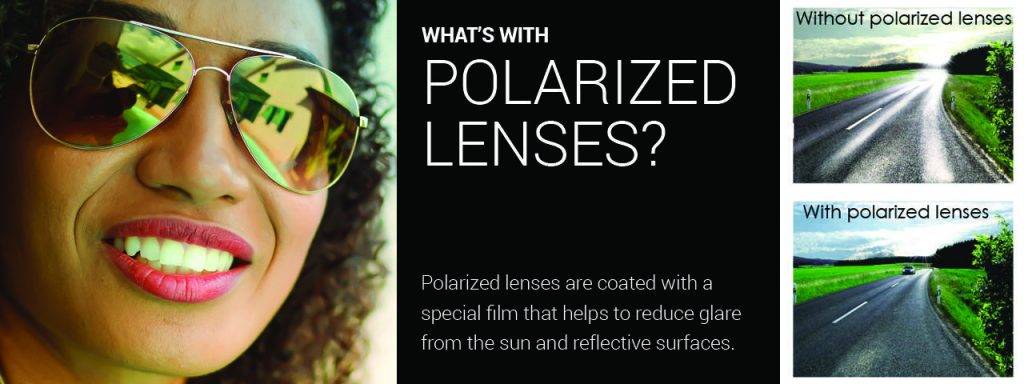What are polarized sunglasses?
Polarized lenses are known for their ability to reduce glare and improve color contrast in bright light. These lenses enhance visual clarity, reduce eye strain, and provide maximum protection in bright environments.
Polarized lenses are recommended for outdoor use, especially in environments known for reflecting light and producing glare, such as:
1. Near the water
Oceans, rivers and lakes are all bodies of water that reflect the sun’s light. Whether you are fishing, sailing, or jet skiing, polarized lenses can prevent the sun’s light from reflecting off the water and shining into your eyes. They can also help you to see more clearly into the water— a helpful tool for successful fishing.
2. On the ski slopes
Whether you are skiing, sledding, or snowboarding, if you plan to spend the day on snow-covered mountains, polarized lenses will absorb the light reflected off the snow and enhance your visual clarity.
Caution: Some eyecare professionals caution against wearing polarized lenses while skiing as these lenses can affect your ability to distinguish between snow and ice.
3. On the road
The roads and highways are also known for reflecting light, and can cause a dangerous glare while driving. Polarized lenses reduce the light that is reflected off the surface of the highway, increasing depth perception and decreasing drivers fatigue.
Contact an eye doctor near you to discuss how to achieve the best vision possible.
SEE RELATED: Going Skiing – Remember Your Polarized Sunglasses
How do polarized lenses work?
When the sun’s rays shine in different directions, the light is called unpolarized light. When unpolarized light hits a reflective smooth surface, such as a mirror, car window, water or even snow, the reflected light causes the light rays to point in one direction. This transforms the light into polarized light.
Reflected polarized light can be harmful for your eyes— and without the right kind of protection, can cause glare, reduced vision clarity and UV light exposure.
Polarized lenses prevent reflected light from shining directly into your eyes and make it easier to see when bright light is reflected off of smooth surfaces.
Polarized lenses are created differently than regular lenses due to their ‘sandwich’ design. A polarized lens contains three layers: two outer layers made of plastic or glass, and a middle layer containing the polarized material which is stretched into long vertical strands.
This ‘sandwich’ design allows the polarized lens to absorb the horizontal light that is reflected off smooth surfaces, preventing it from reaching your eyes.
When to use polarized lenses
Polarized sunglasses can make a world of difference when it comes to certain activities, such as:
- Fishing
- Boating
- Golfing
- Snow sports
When not to use polarized lenses
Wearing polarized lenses can make it difficult to see the images on LCD screens, such as the screen on your cell phone or car dashboard, or the ATM machine at the bank.
Sometimes, wearing polarized lenses can interfere with your visual clarity.
Here are some situations when wearing polarized lenses is NOT recommended:
- Looking at digital screens or mobile phones
- Driving on icy roads
- Nighttime driving
In these situations, the reflected light and increased glare can signal oncoming danger and help you to avoid accidents.
Polarized vs. regular sunglasses
Regular non-polarized sunglasses rely on the dark tint of the lens to reduce glare.
Polarized lenses have the ability to reduce light energy without increasing lens color density, and are therefore available in a variety of lighter shades.
Note: While most polarized lenses provide 100 percent UV protection, be sure to read the label on the sunglasses before purchasing.
Polarized lenses can be beneficial in bright light environments and help to improve your visual clarity for many different activities.
LEARN MORE: Optical and Contact Lenses
Schedule an appointment with an eye doctor to learn more about polarized lenses and how they can benefit your lifestyle.


